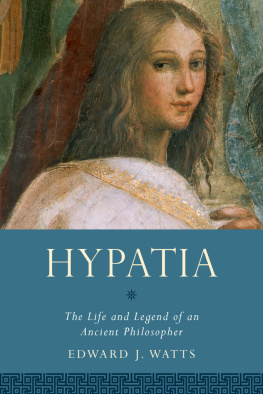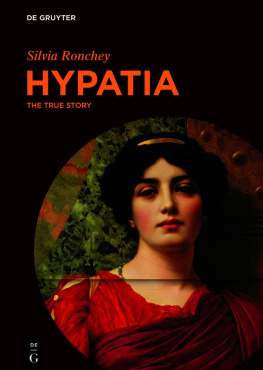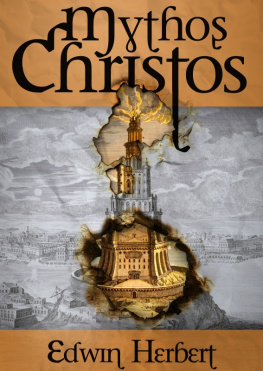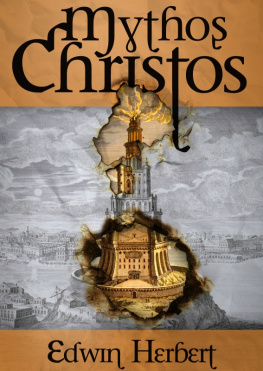Hypatia - Hypatia: the life and legend of an ancient philosopher
Here you can read online Hypatia - Hypatia: the life and legend of an ancient philosopher full text of the book (entire story) in english for free. Download pdf and epub, get meaning, cover and reviews about this ebook. City: Egypt, year: 2017, publisher: Oxford University Press, Incorporated, genre: Religion. Description of the work, (preface) as well as reviews are available. Best literature library LitArk.com created for fans of good reading and offers a wide selection of genres:
Romance novel
Science fiction
Adventure
Detective
Science
History
Home and family
Prose
Art
Politics
Computer
Non-fiction
Religion
Business
Children
Humor
Choose a favorite category and find really read worthwhile books. Enjoy immersion in the world of imagination, feel the emotions of the characters or learn something new for yourself, make an fascinating discovery.
- Book:Hypatia: the life and legend of an ancient philosopher
- Author:
- Publisher:Oxford University Press, Incorporated
- Genre:
- Year:2017
- City:Egypt
- Rating:3 / 5
- Favourites:Add to favourites
- Your mark:
- 60
- 1
- 2
- 3
- 4
- 5
Hypatia: the life and legend of an ancient philosopher: summary, description and annotation
We offer to read an annotation, description, summary or preface (depends on what the author of the book "Hypatia: the life and legend of an ancient philosopher" wrote himself). If you haven't found the necessary information about the book — write in the comments, we will try to find it.
Hypatia: author's other books
Who wrote Hypatia: the life and legend of an ancient philosopher? Find out the surname, the name of the author of the book and a list of all author's works by series.
Hypatia: the life and legend of an ancient philosopher — read online for free the complete book (whole text) full work
Below is the text of the book, divided by pages. System saving the place of the last page read, allows you to conveniently read the book "Hypatia: the life and legend of an ancient philosopher" online for free, without having to search again every time where you left off. Put a bookmark, and you can go to the page where you finished reading at any time.
Font size:
Interval:
Bookmark:

Series Editors: Ronnie Ancona and Sarah B. Pomeroy
This book series provides compact and accessible introductions to the life and historical times of women from the ancient world. Approaching ancient history and culture broadly, the series selects figures from the earliest of times to late antiquity.
Cleopatra
A Biography
Duane W. Roller
Clodia Metelli
The Tribunes Sister
Marilyn B. Skinner
Galla Placidia
The Last Roman Empress
Hagith Sivan
Arsino of Egypt and Macedon
A Royal Life
Elizabeth Donnelly Carney
Berenice II and the Golden Age of Ptolemaic Egypt
Dee L. Clayman
Faustina I and II
Imperial Women of the Golden Age
Barbara M. Levick
Turia
A Roman Womans Civil War
Josiah Osgood
Monica
An Ordinary Saint
Gillian Clark
Theodora
Actress, Empress, Saint
David Potter
Hypatia
The Life and Legend of an Ancient Philosopher
Edward J. Watts

Oxford University Press is a department of the University of Oxford. It furthers the Universitys objective of excellence in research, scholarship, and education by publishing worldwide. Oxford is a registered trade mark of Oxford University Press in the UK and certain other countries.
Published in the United States of America by Oxford University Press
198 Madison Avenue, New York, NY 10016, United States of America.
Oxford University Press 2017
All rights reserved. No part of this publication may be reproduced, stored in a retrieval system, or transmitted, in any form or by any means, without the prior permission in writing of Oxford University Press, or as expressly permitted by law, by license, or under terms agreed with the appropriate reproduction rights organization. Inquiries concerning reproduction outside the scope of the above should be sent to the Rights Department, Oxford University Press, at the address above.
You must not circulate this work in any other form and you must impose this same condition on any acquirer.
Library of Congress Cataloging-in-Publication Data
Names: Watts, Edward Jay, 1975 author.
Title: Hypatia : the life and legend of an ancient philosopher / Edward J. Watts.
Description: New York : Oxford University Press, 2017. | Includes bibliographical references.
Identifiers: LCCN 2016033662 (print) | LCCN 2016040747 (ebook) ISBN 9780190210038 (hardback) | ISBN 9780190210045 (Ebook) | ISBN 9780190659141 (Ebook)
Subjects: LCSH: Hypatia, 415. | Women philosophersEgyptBiography.
Classification: LCC B667.H84 W38 2017 (print) | LCC B667.H84 (ebook) | DDC 186/.4 [B]dc23 LC record available at https://lccn.loc.gov/2016033662
To Karen, Amber, Manasi, and Zoe Watts
Cover Image: Raphael, detail from the School of Athens (c. 15101512), once assumed to represent Hypatia (now assumed to be the portrait of Francesco Maria della Rovere).
Credit Line: School of Athens. Stanza della Segnatura, Stanze di Raffaello, Vatican Palace; Photo courtesy of Scala/Art Resource.
My parents, Dan and Karen Watts, are both scientists who have worked in industry and/or taught in universities for more than four decades. I always understood that both of them were accomplished in their fields and passionate about their workand this is a passion that I believe Hypatia shared. When I was growing up, I had no appreciation for the barriers that this overwhelming love of science and pride in discovery enabled my mother to overcome as a female scientist who began her career in the late 1960s and early 1970s. This makes her successes even more impressive. I see a similar love of discovery in my daughter Zoe and my son Nathaniel (both of whom won their science fairs today). They may or may not decide to become scientists, but, whatever they do in the future, I hope that they share their grandparents passion for it. This is also a book inspired by my sister Amber and my wife, Manasi, two incredibly strong women with the wisdom to embrace the lives they wanted to lead. Both of them know how much I admire them for making difficult but courageous choices. Manasi deserves particular credit for making this project what it has become. Through many long walks and lunches, her insightful suggestions and probing questions helped me to better understand the person that Hypatia was and pushed me to make her life rather than her death the true centerpiece of the book. I cannot be more grateful to her for the book that resulted from her perceptiveness.
Many other friends and colleagues helped enrich and improve this study. Cristiana Sogno carefully read an entire draft of the manuscript and, through her acumen and advice, made the work much stronger and more tightly argued. Gyburg Uhlmann offered thoughtful comments that helped me refine my arguments about Pappus and Porphyry. Peter Brown offered suggestions for improving arguments related both to late antiquity and early modern English and French history. Stefan Vranka, Ronnie Ancona, Sarah Pomeroy, and an anonymous reader all offered important advice that made the manuscript clearer and more efficient at the point when it reached the press. Sarah Svendsen helped it move through the production process.
Alex Petkas, Lieve Van Hoof, David Maldonado, and Alan Cameron shared forthcoming chapters with me that helped me think in new ways about Hypatias students and her larger social world. At a very early point in this project, Gillian Clark was generous enough to send the entire manuscript of her wonderful biography of Monica, a book that is inspiring in more ways than one. At a later point, I was privileged to read David Potters Theodora manuscript and talk at some length about his experiences writing it.
This book also grew out of numerous conversations with many friends and colleagues over the past few years. For these I thank Brad Storin, Oliver Nicholson, Tina Shepardson, Diane Fruchtman, Maria Dzielska, David Brakke, Tudor Sala, Christopher Haas, Ann Hanson, Carly Maris, Susan Harvey, Andrea Sterk, Jorit Wintjes, Cam Grey, Genevieve Gessert, Michele Salzman, Susanna Elm, Elizabeth Depalma Digeser, Shane Bjornlie, Raffaela Cribiore, Michael Kulikowski, Dawn Teresa LaValle, Christian Wildberg, Henriette Harich-Schwarzbauer, Kate Cooper, Alberto Quiroga Puertas, Marco Formisano, Tom Barton, Mark Hanna, Dana Velasco Murillo, Seth Lerer, Denise Demetriou, and Tom Gallant. I am equally grateful to audiences in Krakw, Berlin, Princeton, Minnesota, and San Diego who offered their own responses to material presented in this book. Alexia Anas and the Hellenic Cultural Society deserve special mention for creating a friendly and exciting environment in which to present scholarship about the Greek world in San Diego. As a final word, I want to thank Carol Vassiliadis for her extremely generous support for research into early Byzantine studies at UCSDsupport that made the completion of this project possible.
Carlsbad, California, April 21, 2016
The fifth-century Roman Empire depended on its citizens accepting an intricate illusion. People were encouraged to believe that the state in which they lived and the people who administered it enjoyed such power that ordinary people could not challenge them. Imperial officials, local elites, church leaders, and military officers colluded to manage the empires cities through a combination of threats, rewards, and personal relationships that hid how precarious a grip they held on public order. Little things went a long way in maintaining this illusion of elite control. The wealthy city councilman who helped arrange the wedding of a client, the governor who pardoned a criminal he could have executed, and the bishop who fed starving migrant workers all, in their own ways, built the individual relationships that sustained the empire. Elites gave enough of their time and money that ordinary people usually felt they had the support they needed to survive in the Roman world. Most of the time, regular Romans who had a problem relied upon the elites with whom they had ties to shepherd them through this system. Most of the time, the system worked.
Font size:
Interval:
Bookmark:
Similar books «Hypatia: the life and legend of an ancient philosopher»
Look at similar books to Hypatia: the life and legend of an ancient philosopher. We have selected literature similar in name and meaning in the hope of providing readers with more options to find new, interesting, not yet read works.
Discussion, reviews of the book Hypatia: the life and legend of an ancient philosopher and just readers' own opinions. Leave your comments, write what you think about the work, its meaning or the main characters. Specify what exactly you liked and what you didn't like, and why you think so.









